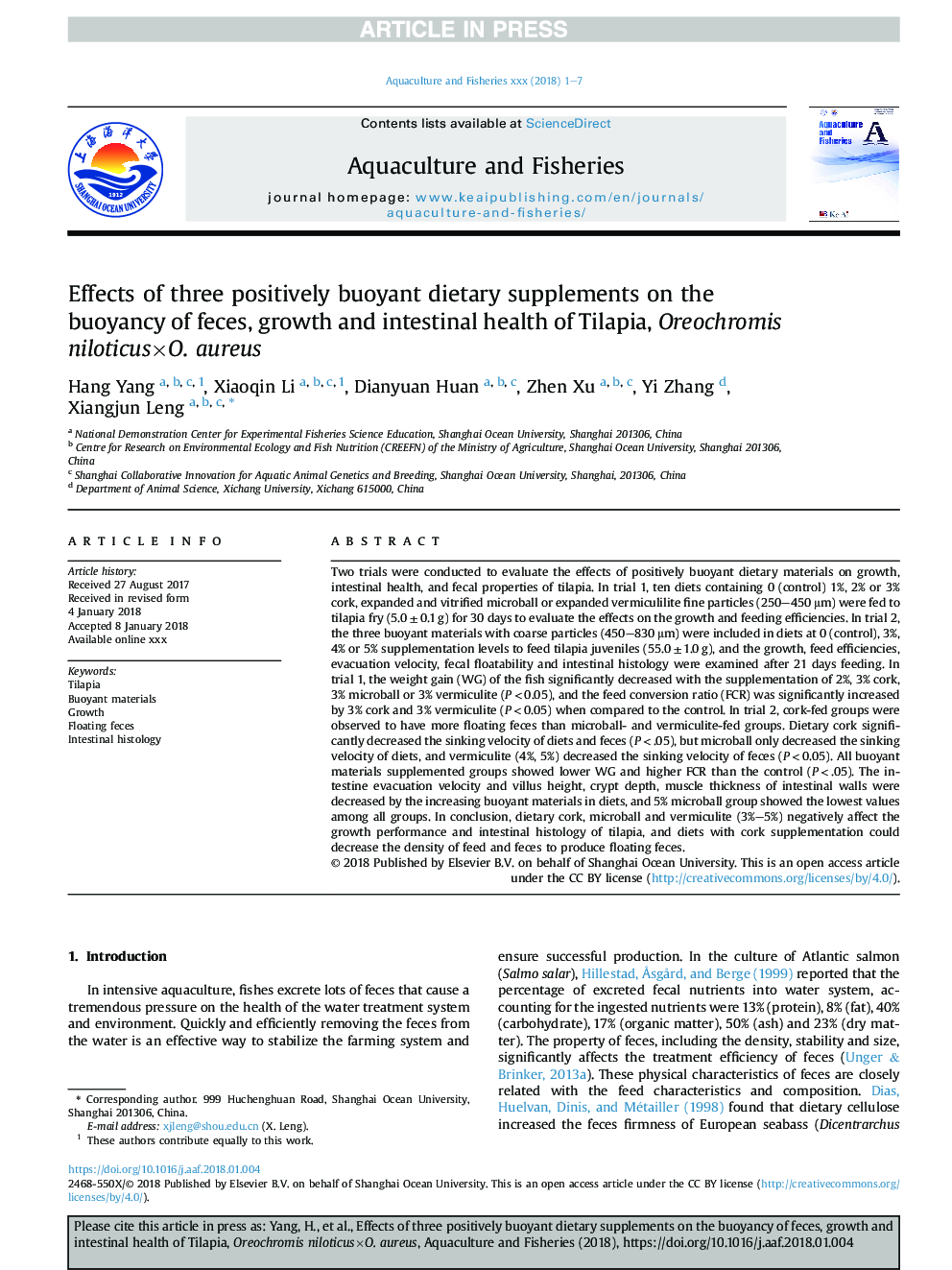| کد مقاله | کد نشریه | سال انتشار | مقاله انگلیسی | نسخه تمام متن |
|---|---|---|---|---|
| 8919984 | 1643251 | 2018 | 7 صفحه PDF | دانلود رایگان |
عنوان انگلیسی مقاله ISI
Effects of three positively buoyant dietary supplements on the buoyancy of feces, growth and intestinal health of Tilapia, Oreochromis niloticusÃO. aureus
دانلود مقاله + سفارش ترجمه
دانلود مقاله ISI انگلیسی
رایگان برای ایرانیان
موضوعات مرتبط
علوم زیستی و بیوفناوری
علوم کشاورزی و بیولوژیک
علوم آبزیان
پیش نمایش صفحه اول مقاله

چکیده انگلیسی
Two trials were conducted to evaluate the effects of positively buoyant dietary materials on growth, intestinal health, and fecal properties of tilapia. In trial 1, ten diets containing 0 (control) 1%, 2% or 3% cork, expanded and vitrified microball or expanded vermiculilite fine particles (250-450â¯Î¼m) were fed to tilapia fry (5.0â¯Â±â¯0.1â¯g) for 30 days to evaluate the effects on the growth and feeding efficiencies. In trial 2, the three buoyant materials with coarse particles (450-830â¯Î¼m) were included in diets at 0 (control), 3%, 4% or 5% supplementation levels to feed tilapia juveniles (55.0â¯Â±â¯1.0â¯g), and the growth, feed efficiencies, evacuation velocity, fecal floatability and intestinal histology were examined after 21 days feeding. In trial 1, the weight gain (WG) of the fish significantly decreased with the supplementation of 2%, 3% cork, 3% microball or 3% vermiculite (Pâ¯<â¯0.05), and the feed conversion ratio (FCR) was significantly increased by 3% cork and 3% vermiculite (Pâ¯<â¯0.05) when compared to the control. In trial 2, cork-fed groups were observed to have more floating feces than microball- and vermiculite-fed groups. Dietary cork significantly decreased the sinking velocity of diets and feces (Pâ¯<â¯.05), but microball only decreased the sinking velocity of diets, and vermiculite (4%, 5%) decreased the sinking velocity of feces (Pâ¯<â¯0.05). All buoyant materials supplemented groups showed lower WG and higher FCR than the control (Pâ¯<â¯.05). The intestine evacuation velocity and villus height, crypt depth, muscle thickness of intestinal walls were decreased by the increasing buoyant materials in diets, and 5% microball group showed the lowest values among all groups. In conclusion, dietary cork, microball and vermiculite (3%-5%) negatively affect the growth performance and intestinal histology of tilapia, and diets with cork supplementation could decrease the density of feed and feces to produce floating feces.
ناشر
Database: Elsevier - ScienceDirect (ساینس دایرکت)
Journal: Aquaculture and Fisheries - Volume 3, Issue 2, March 2018, Pages 72-78
Journal: Aquaculture and Fisheries - Volume 3, Issue 2, March 2018, Pages 72-78
نویسندگان
Hang Yang, Xiaoqin Li, Dianyuan Huan, Zhen Xu, Yi Zhang, Xiangjun Leng,